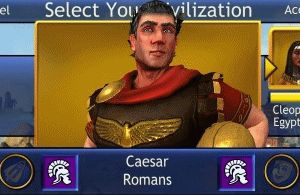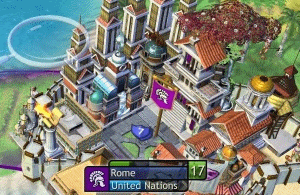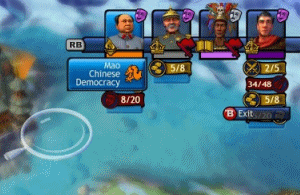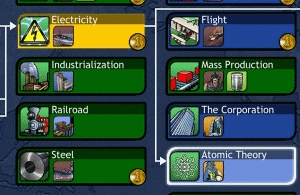
Review: Civilization Revolution

Turn-based Strategy/God Sim
Sid Meier’s legendary series gets the next-gen treatment.
![]()
Mark
Okay it’s time for a quick history lesson before today’s review. The first Civ game was the original Civilisation, a tabletop boardagme released by Avalon Hill back in 1980, a hellishly complex mix of tokens and cards that took two to eight players at least eight hours to finish an average game. Then in 1991 Sid Meier made a computer game called Civilization for Microprose, although it’s still a contentious issue how much the videogame was based (read: ripped off) of the tabletop version and how much was original concepts from Meier.

People called Romanes they go the house.
Since then there have been a steady stream of Civ releases from fully fledged sequels, console conversions, expansion packs and the odd non-Meier release thanks to the original tabletop game and a fat-arse law suit they dropped on Microprose. So fast forward to today and we have the latest entry in the Civ series, a new version of Civilization IV designed from the ground just for home consoles… oh dear does the sound of that worry anybody else?
Upfront I just want to say that I know this game and possibly this review is going to piss off long term fans of the Civ series with its constant cycle of new release followed by expansion pack bloating followed by new sequel pruning and streamlining followed by expansion pack… many of the things that have endeared it to gamers over the last twenty plus years have been cut back or removed all together. But give it a chance and I hope you’ll be surprised at just how well they’ve done it.

Rome reinvented but without cab drivers trying to kill your tourist arse.
Every game of Civ gives you the same basic goal of proving your civilizations might over all others by achieving victory on a planetary scale. You achieve victory buy fulfilling goals from one of four victory types: conquest, culture, economic and technology. Conquest victories are the most direct with you needing to capture the capital city of all the other civilizations to declare yourself warlord of the entire planet. Culture victories require you to have twenty great persons, wonders or cities converted to your civilization after which you can construct the United Nations wonder and rule the world using politics and negotiation.
Economic victories need you to have saved twenty thousand gold and then construct the World Bank making you the world’s own bank manager. Finally you can research and construct space ship capable of reaching Alpha Centauri to achieve a technology victory and prove your superior intellect. Selecting the right civilization at the start and building the right units and building are critical to achieving your chosen goal after all how can you conquer the world in you don’t have an army or increase your cultural reach if your citizens are all ignorant savages.

Chinese Democracy exists and not just in Axl Rose's drug-addled head.
By having the four victory types and over a dozen basic civilizations each with there own strengths and weaknesses and a randomly generated world map every game of Civ is a different experience. Once you’ve played a few times you’ll know what tech to research first, what land tiles to covet and the effects they have, what units and building to build and where found new cities.
So let’s take a look at not only the changes to the existing formula but how the game works for those yet to play a Civ game. The first thing and most obvious change is the length of a game. Normally you’d expect to play for six to nine hours provided you start at the Stone Age and work through to the space age and have a good number of rival civilizations to compete against.
Here it’ll run you more like three, four if you really take your time or get bogged down going for a conquest victory All the ages are here from the starting Stone Age where you’ll be building granaries and wonders like Stonehenge through the medieval, renaissance, industrial and modern space age with nuclear weapons and the Apollo program. A few units, buildings and wonders have been removed to keep the game’s pace nice and brisk but the classics are here and the balance has been kept intact with every big advantage like the great wall having a built in expiry date when a particular science is discovered.

Fear leads to anger, anger leads to electricity, electricity leads to tech victory.
The majority of your time will be spent micromanaging your cities by deciding what buildings, units and wonders are constructed within them, what your workers will concentrate on be it science, industrial productivity, culture, trade or a balance of all. Descending on a cities roll can be vital to success in the game as armies need units, traders need caravans and scientists need libraries and universities to study in.
Combat is still handled by building units that you can sent out into the world to defend your cities and territory or attack rival units once you’ve declared war upon them. Different units have different strengths with early units like archers and pikemen being particularly strong at defence while mounted units and legionaries being better for offence. As before a few standard units are missing from the list but you won’t miss any of them with the exception of the always useful paratroopers in the final stages of the game.
All of this comes together in the games interface and despite the fear that a gamepad will never replace the good old mouse ‘n’ keyboard combo it gives you total control over everything in your empire with a few button pushes. At any time you can check all the important info such as what your cities are doing, who you’re at war or what you’re researching without needing to trawl through countless menus. Everything is upfront and clear and making changes is just as simple be it building a new unit or even changing governments.
|
Lurk Secondary Review Civ two on the PC stole days, nay weeks from me. I was supposed to have been preparing for my GCSEs and instead I spent far too long playing the game. Civ: Rev is just as bad, for stealing time from you. On the first day I got this I put in a good six hours playing this game. It draws you in and doesn’t let you from its grasp. Which is great when you have the time to play it, but damn its annoying when you’re supposed to be doing things in your spare time other than sitting in front of the 360. The big, cartoony graphics are perfect for this game. It makes it a bit more palatable than the rather dry, slightly too serious tone of the previous games. Other graphical touches I liked were the change in clothes for the advisers and updating of the buildings as the game goes along the time line. The smaller maps, quicker speeds when it comes to building and researching stuff is an improvement on the frankly sometimes glacial speed of the previous games. This means the game is more accessible than the PC versions. In short if you’re a fan of tactical games then get this. Secondary Score: 9/10 |
The only downside to this simplicity is the visuals do have a slight whiff of an xbox live arcade game rather than a full price release but given the total lack of slowdown I’m happy to sacrifice unneeded visual gloss for speed and smoothness. Whilst I’m picking at faults I’d just like to mention the games AI.
Now it’s a given that any Civ AI will ‘cheat’ e.g. have more units or money than it should early in the game to stop you steamrolling through them before they’ve had a chance to get going but here despite playing half a dozen games through to full completion I’ve yet to see any AI Civ declare war on another. It might not sound that important given that the game is you vs. the world, but in past Civ games making the right friends and then playing them off other enemies was important. Now everyone just comes begging to you for money and research and declares war on you if you do kowtow.
Ignoring the few niggling faults like the single mined AI and cheap visuals there’s loads on offer here as the now standard Xbox Live multiplayer option works great with four player ranked/unranked matches available along with scenarios of the week to download and play. The achievement points come easy and encourage replaying the game different ways to not only get achievement points but un lock all the great people and wonders of the world the game has to offer.
If you’ve never played a Civ game before get it now as not only is it a great game in its own right it also works brilliantly as a sort of ‘my first Civ’. If you’ve played Civ before and can stand to have the pace increased and the micromanagement cut back give it a try but just know upfront that this isn’t a conversion but its own game. A revolution? No just a good game that deserves to not get written off just because it’s not on the PC.
Rating: 









8/10
